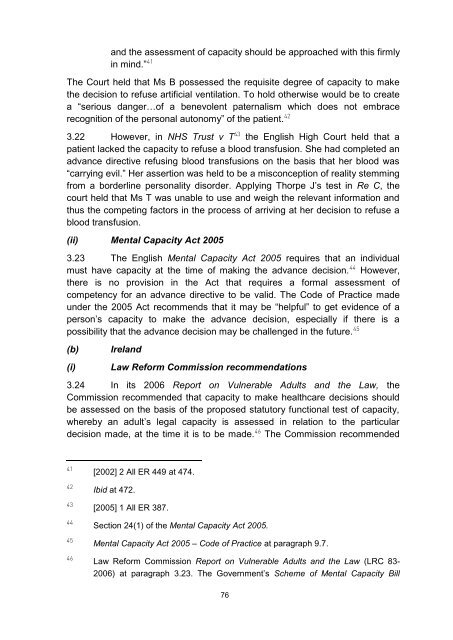Consultation Paper on Bioethics - Law Reform Commission
Consultation Paper on Bioethics - Law Reform Commission
Consultation Paper on Bioethics - Law Reform Commission
Create successful ePaper yourself
Turn your PDF publications into a flip-book with our unique Google optimized e-Paper software.
and the assessment of capacity should be approached with this firmly<br />
in mind.” 41<br />
The Court held that Ms B possessed the requisite degree of capacity to make<br />
the decisi<strong>on</strong> to refuse artificial ventilati<strong>on</strong>. To hold otherwise would be to create<br />
a “serious danger…of a benevolent paternalism which does not embrace<br />
recogniti<strong>on</strong> of the pers<strong>on</strong>al aut<strong>on</strong>omy” of the patient. 42<br />
3.22 However, in NHS Trust v T 43 the English High Court held that a<br />
patient lacked the capacity to refuse a blood transfusi<strong>on</strong>. She had completed an<br />
advance directive refusing blood transfusi<strong>on</strong>s <strong>on</strong> the basis that her blood was<br />
“carrying evil.” Her asserti<strong>on</strong> was held to be a misc<strong>on</strong>cepti<strong>on</strong> of reality stemming<br />
from a borderline pers<strong>on</strong>ality disorder. Applying Thorpe J‟s test in Re C, the<br />
court held that Ms T was unable to use and weigh the relevant informati<strong>on</strong> and<br />
thus the competing factors in the process of arriving at her decisi<strong>on</strong> to refuse a<br />
blood transfusi<strong>on</strong>.<br />
(ii) Mental Capacity Act 2005<br />
3.23 The English Mental Capacity Act 2005 requires that an individual<br />
must have capacity at the time of making the advance decisi<strong>on</strong>. 44 However,<br />
there is no provisi<strong>on</strong> in the Act that requires a formal assessment of<br />
competency for an advance directive to be valid. The Code of Practice made<br />
under the 2005 Act recommends that it may be “helpful” to get evidence of a<br />
pers<strong>on</strong>‟s capacity to make the advance decisi<strong>on</strong>, especially if there is a<br />
possibility that the advance decisi<strong>on</strong> may be challenged in the future. 45<br />
(b) Ireland<br />
(i) <strong>Law</strong> <strong>Reform</strong> Commissi<strong>on</strong> recommendati<strong>on</strong>s<br />
3.24 In its 2006 Report <strong>on</strong> Vulnerable Adults and the <strong>Law</strong>, the<br />
Commissi<strong>on</strong> recommended that capacity to make healthcare decisi<strong>on</strong>s should<br />
be assessed <strong>on</strong> the basis of the proposed statutory functi<strong>on</strong>al test of capacity,<br />
whereby an adult‟s legal capacity is assessed in relati<strong>on</strong> to the particular<br />
decisi<strong>on</strong> made, at the time it is to be made. 46 The Commissi<strong>on</strong> recommended<br />
41 [2002] 2 All ER 449 at 474.<br />
42 Ibid at 472.<br />
43 [2005] 1 All ER 387.<br />
44 Secti<strong>on</strong> 24(1) of the Mental Capacity Act 2005.<br />
45 Mental Capacity Act 2005 – Code of Practice at paragraph 9.7.<br />
46 <strong>Law</strong> <strong>Reform</strong> Commissi<strong>on</strong> Report <strong>on</strong> Vulnerable Adults and the <strong>Law</strong> (LRC 83-<br />
2006) at paragraph 3.23. The Government‟s Scheme of Mental Capacity Bill<br />
76

















